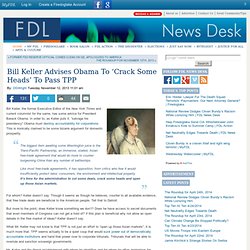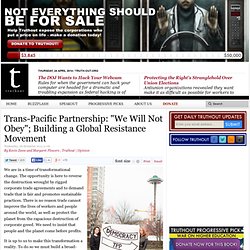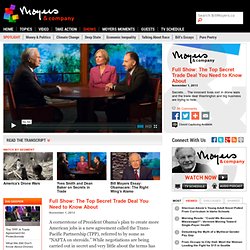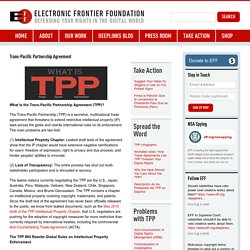

Expose the TPP. Bill Keller Advises Obama To ‘Crack Some Heads’ To Pass TPP. Bill Keller, the former Executive Editor of the New York Times and current columnist for the same, has some advice for President Barack Obama.

In order to, as Keller puts it, “salvage his presidency” Obama must destroy accountability for corporations. This is ironically claimed to be some bizarre argument for domestic prosperity. The biggest item awaiting some Washington juice is the Trans-Pacific Partnership, an immense, stalled, Asian free-trade agreement that would do more to counter burgeoning China than any number of battleships.Like most free-trade agreements, it has opposition, from critics who fear it would insufficiently protect labor, consumers, the environment and intellectual property. It’s time for the administration to cut some deals, crack some heads and open up those Asian markets. For whom? But more to the point, does Keller know something we don’t?
What Mr. Mr. Image from hughesp under Creative Commons license. Trans-Pacific Partnership: "We Will Not Obey"; Building a Global Resistance Movement. (Photo: Caelie_Frampton / Flickr)We are in a time of transformational change.

The opportunity is here to reverse the destruction wrought by rigged corporate trade agreements and to demand trade that is fair and promotes sustainable practices. There is no reason trade cannot improve the lives of workers and people around the world, as well as protect the planet from the rapacious destruction of corporate greed. We need to insist that people and the planet come before profits. It is up to us to make this transformation a reality. To do so we must build a broad-based, movement of movements that sends a clear message to Washington, DC: "If you pass the Trans-Pacific Partnership, we will not obey.
" The Obama administration has made it a priority to have the Trans-Pacific Partnership (TPP) completed by the end of the year. At present, with the help of grass-roots pressure, momentum is growing in Congress to stop Fast Track. Time to Build a Democratic Movement of Resistance. What you don't know will hurt you. "A Corporate Trojan Horse": Obama Pushes Secretive TPP Trade Pact, Would Rewrite Swath of U.S. Laws. The Top Secret Trade Deal You Need to Know About. BILL MOYERS: This week on Moyers & Company… TPP: the big story you haven’t heard about.

YVES SMITH: There'd be no reason to keep it so secret if it was in the interest of the public. DEAN BAKER: This really is a deal that's being negotiated by corporations for corporations and any benefit it provides to the bulk of the population of this country will be purely incidental. BILL MOYERS: And drone warfare. Deadly fire from the sky. ANNOUNCER: Funding is provided by: Carnegie Corporation of New York, celebrating 100 years of philanthropy, and committed to doing real and permanent good in the world. The Kohlberg Foundation. Independent Production Fund, with support from The Partridge Foundation, a John and Polly Guth Charitable Fund. The Clements Foundation. Park Foundation, dedicated to heightening public awareness of critical issues. The Herb Alpert Foundation, supporting organizations whose mission is to promote compassion and creativity in our society. Lori Wallach: Live Q&A on TPP and Fast Track. May 23, 2013. Trans Pacific Partnership Agreement. What Is the Trans-Pacific Partnership Agreement (TPP)?

The Trans-Pacific Partnership (TPP) is a secretive, multinational trade agreement that threatens to extend restrictive intellectual property (IP) laws across the globe and rewrite international rules on its enforcement. The main problems are two-fold: (1) Intellectual Property Chapter: Leaked draft texts of the agreement show that the IP chapter would have extensive negative ramifications for users’ freedom of expression, right to privacy and due process, and hinder peoples' abilities to innovate. (2) Lack of Transparency: The entire process has shut out multi-stakeholder participation and is shrouded in secrecy. The twelve nations currently negotiating the TPP are the U.S., Japan, Australia, Peru, Malaysia, Vietnam, New Zealand, Chile, Singapore, Canada, Mexico, and Brunei Darussalam. The TPP Will Rewrite Global Rules on Intellectual Property Enforcement The leaked U.S.
Why You Should Care.